#Film Criticism
Text
Even the phrase “eat the rich” feels trite. It neatly sums up a tote bag slogan era of anti-capitalism in culture, cutesy shorthand that’s now entirely representative of a watered down, inoffensive type of politics. You could argue that satire born out of this politics is predictable because its targets are predictable: we all know rich people suck and perhaps they don’t necessarily deserve nuance. But the beauty of good satire is in using a scalpel to eviscerate a subject, by having a distinct perspective and striking with precision.
- Patrick Sproull, "Why all “eat the rich” satire looks the same now"
9K notes
·
View notes
Text
I saw a few folks talking about how they can’t write meta/analyze media and I have a suggestion—read some film theory. Not criticism—theory. Consider angles, philosophies, contexts, ways of analyzing media that's not about whether the media is Good or Bad, but how it works.
(Please note: I'm not saying you have to do this in order to write meta or analysis, but theory is an excellent starting point for close reading texts and a lot of the writing within film and TV especially is very accessible.)
A few recs:
Film Theory and Criticism, eds. Leo Braudy and Marshall Cohen. This collects a massive amount of work, important essays, and important perspectives on various aspects of theory and critique. Really a foundational text that keeps on being updated.
From Caligari to Hitler. I believe literally everyone should read this book (or even just the introduction) to understand how film reflects and affects national character. This is specifically about Germany between the wars, but it is frightening how applicable a lot of it is to our current moment.
The Celluloid Closet. One of the seminal texts in studying queerness in film. There's also an accompanying documentary that is excellent.
Monsters in the Closet. This is specifically about horror film, but is one of the first to explore how queerness in particular is typed and exploited in horror.
Visual Pleasure and Narrative Cinema. Laura Mulvey defined the male gaze for an entire generation of feminist film scholars and critics. Her essay is slightly dated but still essential and applicable.
The Dread of Difference. Collects a group of important feminist essays specifically about horror films. Again, a lot of the work is quite applicable overall.
The Monstrous Feminine. Barbara Creed's work is essential feminist film theory.
The Women Who Knew Too Much. Modleski is a Hitchcock scholar and her work is expansive and entertaining.
From Reverence to Rape. Very much a companion to Mulvey, addressing the way that Hollywood itself distorts female roles. Again, some datedness, but important and easy to read.
Reel to Real: Race, Sex, and Class at the Movies. bell hooks. Don't need to say more.
Any other film folks can add more, but these are the ones that I think are the most interesting and accessible as starting points.
#ofmd#the avengers#film theory#film criticism#meta#book recommendations#media literacy#critical thinking
278 notes
·
View notes
Text
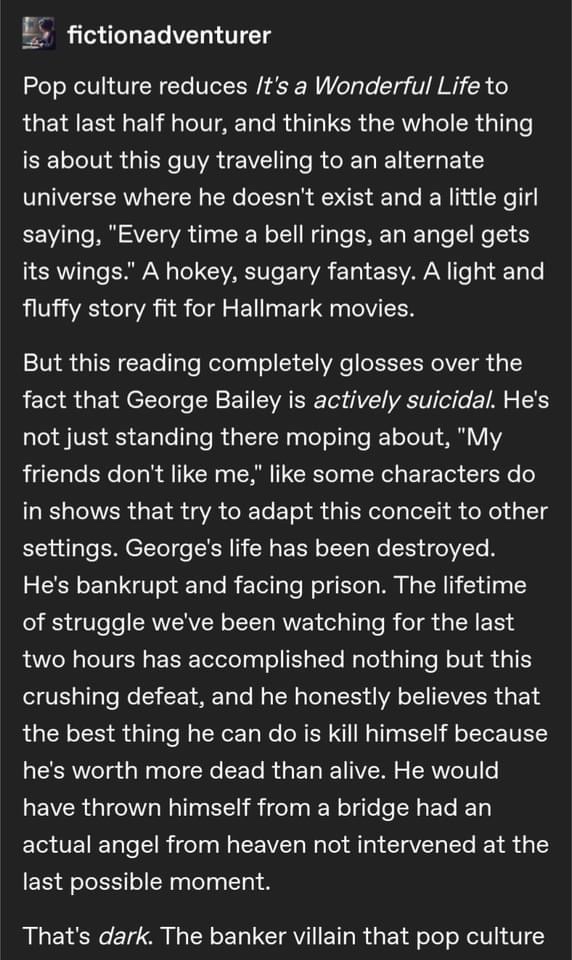
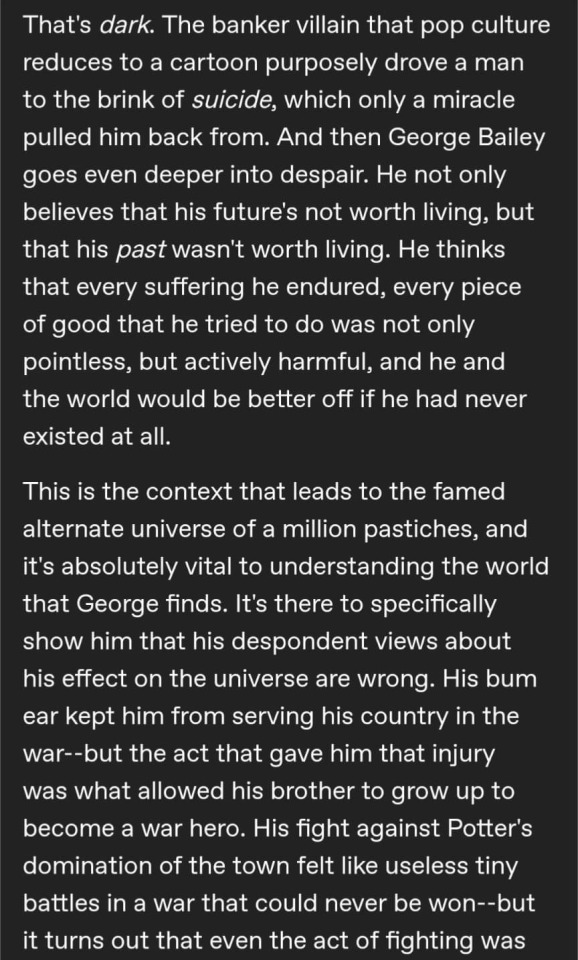
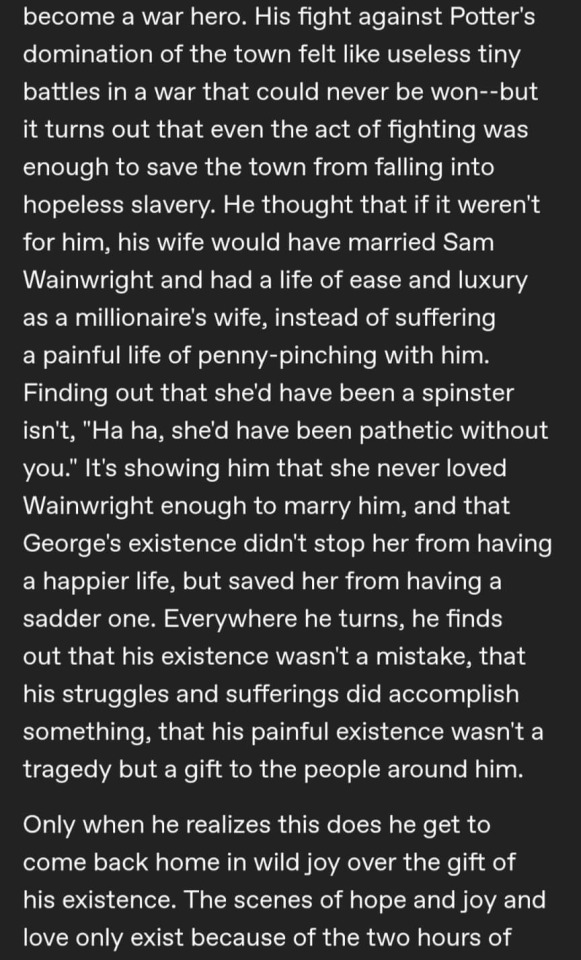
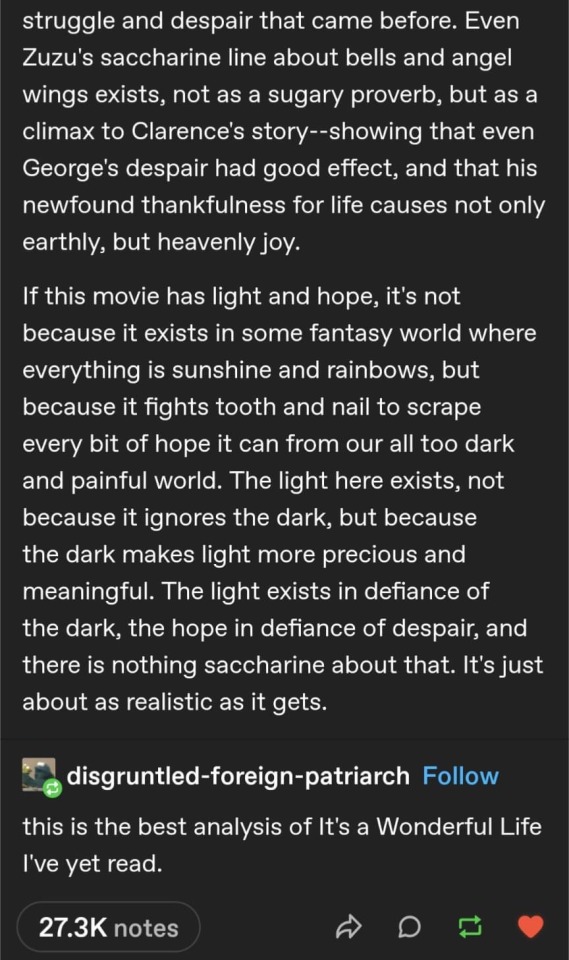
YES.
ALL OF THIS.
THIS is why this film still hits so hard after all these years.
It’s not some sugary BS about “you can think yourself out of suicidal depression by just learning to appreciate what you’ve got”.
It’s about the fact that people who work really fucking hard for their communities experience active, targeted, criminal pushback from exploiters.
About the fact that caring, in all its manifestations, is incredibly physically and mentally taxing and is often done by disabled people - YES, George Bailey is a disabled protagonist. His impairment prevents him from military service and actively causes him chronic pain that, as a person who lives with it, *will* affect his energy levels and fatigue constantly.
Notably, IAWL actually has a bunch of disabled characters. Not only is George disabled, but I’d put money on his uncle who loses the money being ADHD and very possibly having other learning disabilities and the film *actively* flagging that fact to the audience, even if it doesn’t necessarily know what ADHD is.
Which casts a whole new light on its principal villain being disabled. Instead of Old Man Potter being a flat caricature of “disability = evil”, what he *actually* is is a fantastic example of the fact that marginalisation in one axis does not prevent someone being an active oppressor - and wealth and class privilege, in particular, tend to mean a person actively acting to oppress other people who share their marginalisation in order to privilege the interests of their own class as a whole. Sometimes even damaging their own individual interests to do so.
It’s also super interesting that the *material* miracle in the film is not the appearance of an angel to show George what life would have been like if he had never existed, but the *community solidarity* that saves him from jail and his family from penury. The supernatural intervention can change his *mindset*, and that is *incredibly* important, given it *literally* stops him killing himself, but the *material* intervention is mutual aid from his own community that he has given so much to.
Which is incredibly radical as a message. It’s not saying “faith is worthless”; it’s saying “faith can be an incredibly important factor in creating resilience in moments of despair, but we can’t, and *need not*, wait for a supernatural miracle to save us; we have the capacity to save ourselves and each other in our hands right now”.
#it’s a wonderful life#film criticism#disability#disability in media#mutual aid in media#george bailey#wow I know I liked it’s a wonderful life but apparently my feelings are way stronger than I appreciated#why I fucking hate sugary reductionism in pop culture sometimes#fuck I love this movie#disability in film
176 notes
·
View notes
Text
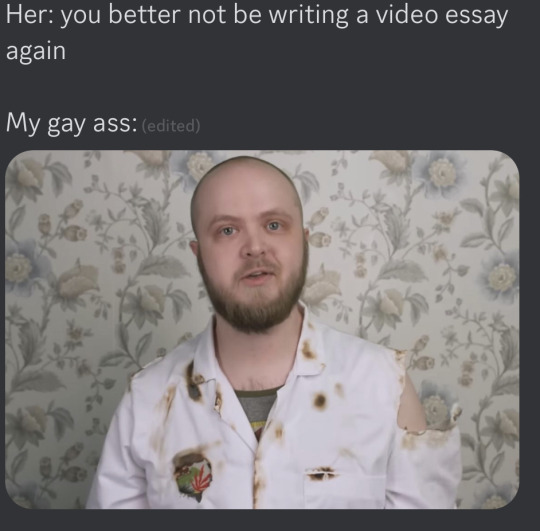
Thought I’d contribute this to the discussion :)
94 notes
·
View notes
Text



Meditative TV
Tales from the Loop // Mushishi // Joe Pera Talks with You
“Many films diminish us. They cheapen us, masturbate our senses, hammer us with shabby thrills, diminish the value of life. Some few films evoke the wonderment of life's experience, and those I consider a form of prayer. Not prayer "to" anyone or anything, but prayer "about" everyone and everything. I believe prayer that makes requests is pointless. What will be, will be. But I value the kind of prayer when you stand at the edge of the sea, or beneath a tree, or smell a flower, or love someone, or do a good thing. Those prayers validate existence and snatch it away from meaningless routine.”
—Roger Ebert, “A Prayer Beneath the Tree of Life”
120 notes
·
View notes
Text
So Jennifer Lawrence was too fat to play Katniss Everdeen, but Rachel Zegler is too thin to play Lucy Gray Baird? I don't wanna say you guys don't like women but maybe some of you guys maybe don't like women
#to comment on the katniss thing i think that yes the movies could have emphasised her hunger more but jlaws body is NOT that noticeable#like jlaw isnt even fat she just said she didnt diet#jennifer lawrence#rachel zegler#the hunger games#thg#the ballad of songbirds and snakes#tbosas#lucy gray baird#katniss everdeen#feminism#film criticism
111 notes
·
View notes
Text

#tom hardy#venom#venom 2018#venom let there be carnage#eddie brock#eddie brock x venom#gay#gaycel#mlm yearning#mlm#I watched both movies back to back and they are amazing. it’s so gay you don’t even understand how obsessed I am#film critic#film criticism#venom 2018 review#symbrock
48 notes
·
View notes
Text

Manny Farber, February 20, 1917 – August 18, 2008.
Patricia Patterson, The Conversation (Manny and Steve at the Table), 1990.
38 notes
·
View notes
Text

!!!!!!!!!!!
37 notes
·
View notes
Text
Disney's Wish: A Simple Meal Well Made.
As somebody who enjoys all sorts of animation that hits that sweet spot for me, I agree with the general consensus of fellow cartoon fans that animation is NOT just for kids nor should it only enjoyable to kids.
I also agree that while some are made with kids in mind, that doesn't mean that they are bereft of thought put into them. Avatar might be overdone as the go-to example but that it is does speak to its quality and all those it had inspired.
Even so, even wacky comedies like Billy & Mandy have a lot of thought put into them in terms of what the creators think will bust a gut. They don't just settle for wacky comedies because it's what the kids want but more what they wanna show. Even if some are strongarmed into being more comical, most will at least roll up their sleeves and have bit of fun.
However, I feel like this need to highlight animation's appeal across generations can often have a lot of fans put pressure on certain projects from certain studios of significant recognition. That is to say, there's little room to be just "mid" as the kids call it.
Like... we all know the Oscars are bull, right? Like many even admit as much. However, this dismissal of animation each year gets to use largely because there are those who by their hype. We feel our medium has a lot to prove so each movie has to be go big or go home.
Especially after big name companies put out projects that go GIANT between Spider-Verse and The Last Wish.
Of course, as it pertains to Wish, many would consider Disney not going big was unbefitting of their centenary film. I'm not here to advocate for expecting less or that one can't feel more meat could've been added to what they feel is a bit bare bones. I mean, 100 years of movie making is nothing to sneeze at.
But baring that and all else I've discussed above, it can be REALLY easy to fall into the pit trap of seeing Wish far less for what it is and a lot more for what it isn't.
For me?
I found the pacing fairly brisk from start to finish with the songs rarely ever feeling like non sequiturs. Rarely did any moment truly drag out with or was there just because of marketing or comic relief.
I love how we had less of a mystery around King Magnifico being a very selfish behind the scene from Act 1 and only getting worse when he perceives a threat to his power. It very much reads like a fantastical take on Walt Disney's rise in power and shadiness behind the charming facade.
While the heroine was archetypical, I found Asha's story and her friends getting swept up in facing the king more true to life than you think. Especially when viewed through the lens of being analogous to Disney:
King Magnifico as this benevolent ruler who harbors many wishes he promised he might grant. Many of which either come down to how they may not serve him or even threaten him like Saba's. That is, anything new or off-beat that could undermine what he's accomplished or feels entitled to.
Asha being this castle worker who tries to get the position of working with the big man himself and does... only to learn his shady side. Much like how Disney fans find any position in the company to not be the dream job they thought it'd be before learning how deep the rabbit hole goes.
Asha finds another source of magic that grants wishes and unintentionally threatens Magnifico. Given the indie animation boom, it's hard to not see this as creators taking IPs into their own hands without the backing of big megacorps.
Magnifico delves into dark magic that depreive him more and more of whatever scruples he had left in order to quash this rebellion. I think we've seen too many examples of bigger companies trying to outdo the little guys via unethical means of increasing production for money.
The King utilizes the wishes to get more power. Gee, where have I heard the creation of others being stolen/locked away for personal greed? Know anything, Davey-boy?
Asha rounds up her friend to expose the truth. Many of them organize a way to stop this injustice while the King buy out one of their own to try and undermine them. Hmmmm. Anybody hear of any strikes that went on recently?
The climax involves the king's people collectively embracing their inner stars to stand up to the tyrant he's become. Again, strikes?
Hell, I can't help but feel like the Easter Eggs were as lowkey as they could if only so these elements could be highlighted. Surprising considering how nostalgia baiting has been en vogue lately.
But that's a grand chunk of my disorganized thoughts on a movie that I feel many will get worked up now but look back on with a touch more of appreciation. It's hardly the best movie ever and maybe a "Go Giant" ambitious film would have been a crowd pleaser.
But the movie is what it is. And I like it for what it is.
#wish#disney wish#disney's wish#wish 2023#king magnifico#magnifico#wish magnifico#asha#queen amaya#disney#disney movies#film criticism#storytelling#metaphors#wish positivity#disney 100
38 notes
·
View notes
Text
Worst Nightmare Before Christmas criticisms I've ever heard:
(( OOC. paraphrazed and not linking to exact sources but:
>"Why is everyone singing?"
>"Why does this music sound like something out of maralyn manson?"
>"Sally's such a dunce; she's too stupid to get herself out of those ropes at the end."
>"Halloween and Jack don't do anything for their holiday why should they ever have to complain about work?"
>"Sally's such a [derogatory wymen word]!"
>"The Christmas Town elves are disturbing to look at they're so creepy and unsettling."
>"Jack is an incel."
>"Sally's useless and all she ever does is swoon over Jack. She cares about nothing else and just has to be saved by him all the time. Ick."
>"Sally is completely reliant on Jack she's completely codependent on him, actually."
>"Jack Skellington's an expression-less stick man of a character. He's a nothing burger."
>"This movie's message amounts to "stay in your place/don't stray from the norm'' when you really think about it. Pretty messed up there, Didney."
>"Sally's so ungrateful and cruel to Jack and not supportive of his Christmas thing."
>"Santa's so mean and angry and bitter and Jack would make a better Santa."
>"Sally's such an ungrateful daughter to Dr. Finkelstein. How dare she want to escape; Fink's just protective, I swear."
>"Jack's Christmas was actually better and Jack should have been allowed to do what he wanted cuz Jack actually really didn't do anything wrong."
PSA time kids: If someone you know says they don't really get/like/are annoyed by Nightmare Before Christmas because of x, x, and x reasons, the correct response is to let them keep that opinion. They're not arguing about out? Don't argue about it. Be adults, kids. Hatedom =/= criticism. People can appreciate something and just not personally like it that much (like me and Invader Zim or Rocky Horror) or even like it but also be able to point out the flaws in it (like me and Monster High). What's important is that this someone accepts that YOU love this thing, while YOU respect THEIR boundaries and not try to make them "see your way". --Not to get off track, but nothing makes someone ACTUALLY resent your special interest than you being really aggressive and demanding about it to them--
Within fandom, especially your own, I think you should be able to spot actual "hatedom" when you see it -and/or, ascertain what makes a bad take actually bad vs a take you just have to disagree with.
For me a bad take is: actively misreading the text/refusing to engage with text on it's own terms; inserting yourself where the text is asking you NOT to; being a jerk about your opinion like you have the one take to rule them all; and finally; coming in with a toxic badfaith/badtake cocktail and not even caring that you're doing so. This is what so many of the worst takes surrounding TNBC amount.
The "Jack is an emotion-less nothingburger of a character" is the one that perplexes me the most. I only ever saw that one once on a "cult movies that are actually not good"-site article. Feel whatever way you want about Jack as a character but I have no idea how you look at that guy and think "no personality" or even no EXPRESSION.
Ya killing me, smalls. ))
What a genuinely horrible rant there!
#READ THE 'keep reading' TAB BEFORE RESPONDING PLEASE#the nightmare before christmas#nightmare before christmas#sally the ragdoll#jack skellington#film criticism#burton critical#critical fandom
34 notes
·
View notes
Text
I’ve finally seen dial of destiny and it was pretty good! Did we need another movie after the last one? No. (Did we need one after the third?) but it was a fun time and it did a lot of elements well.
My favorite thing is seeing all these people freak out that *gasp* a woman, might be the next Indiana jones. Which… have you seen either movie? Indy is not giving that away to anyone. At the end of crystal skull when the hat goes to mutt he immediately yoinks it back. If he wasn’t going to pass down to his own son why should he his god daughter (this movie also ends with him taking his hat back)


The “title” of Indiana jones isn’t going to anyone and never was. Firstly he wouldn’t just pass down to someone he went on one adventure with and secondly it’s his own name why the hell would someone else take it? Get your own nickname (which! Short round, Mutt and Wombat all do) there was never going to be a passing down!
These scenes with the hat signify Indy isn’t going anywhere, but it’s the end of his story.
#film criticism#Indiana jones#indiana jones and the kingdom of the crystal skull#Indiana jones and the dial of destiny#dial of destiny#Indiana jones 5#mutt Williams#henry jones jr#Helena Shaw#franchise#80s movies#minor spoilers#harrison ford
89 notes
·
View notes
Quote
...I’m not a fan of modern fandom. This isn’t only because I’ve been swarmed on Twitter by angry devotees of Marvel and DC and (more recently) “Top Gun: Maverick” and “Everything Everywhere All at Once.” It’s more that the behavior of these social media hordes represents an anti-democratic, anti-intellectual mind-set that is harmful to the cause of art and antithetical to the spirit of movies. Fan culture is rooted in conformity, obedience, group identity and mob behavior, and its rise mirrors and models the spread of intolerant, authoritarian, aggressive tendencies in our politics and our communal life.
A. O Scott, ‘ And Now Let’s Review … ‘, New York Times, May 17, 2023
#a. o. scott#film criticism#The New York Times#fandom#criticism#say what you want about critics but I feel Scott here on modern fandom#do better nerds#be better nerds
113 notes
·
View notes
Text
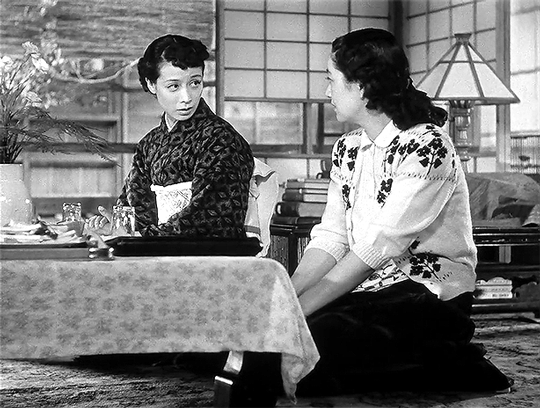
“Early Summer is about the difference between the married and the unmarried, how the married try to persuade or (worse) coerce the unmarried into getting married, and how maybe that isn’t always such a good idea. This theme is explicitly called out more than once in the film.
Early Summer further implies that there may be a good reason why some unmarried people, including Noriko (but not just Noriko), don't want to marry: they may be “that type of person,” as the young lesbian Fumi described herself in Takako Shimura's manga Aoi hana. This subtext rises briefly to the level of text at least once before being ambiguously dismissed.
Both Ozu and Hara remained unmarried until their deaths, and to my knowledge neither were ever credibly reported as having a romantic relationship with anyone. Per Donald Richie’s commentary on the Criterion release (referenced in the next post), Ozu was reported to become angry at any talk of his marrying. Meanwhile Hara, though termed “the eternal virgin” by a film producer for her film image, in real life had close friendships with many women, including a hair and makeup artist whose friendship with Hara began early on and continued after Hara retired into obscurity at the height of her career.
In modern terms we could therefore hypothesize Early Summer as a queer film subtly but firmly protesting compulsory heterosexuality, made by a (possibly) queer director and starring a (possibly) queer actor.
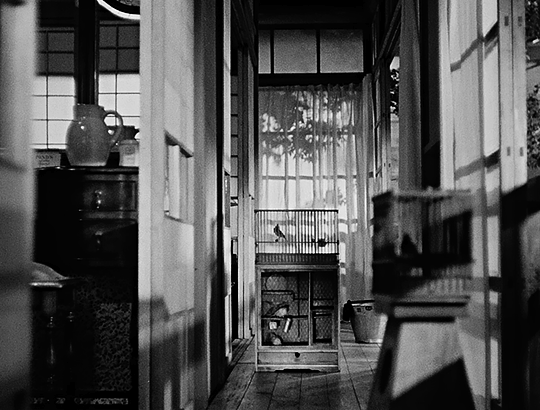
…
Early Summer opens with three establishing shots: first a shot of a dog walking freely on the beach with the ocean in the background, then a shot of a single bird in a cage outside, and then a final shot of birds in cages inside a house. This is the house in the oceanside town of Kamakura in which Noriko (Setsuko Hara’s character) lives, along with her brother Kōichi (Chishū Ryū), his wife Fumiko (Kuniko Miyake), Noriko and Koichi’s father (Ichiro Sugai) and mother (Chieko Higashiyama), and Kōichi and Fumiko’s two young boys.
If we wish, we can interpret the first and third shots as showing a strong contrast between freedom in nature on the one hand, and the restrictions imposed by society and the Japanese family system on the other. In this interpretation the second shot represents Noriko, who has a degree of independence that her mother and Fumiko do not have, but is still constrained by the bonds of family and society.
In the following scenes Kōichi takes an early train to his job as a physician, while Noriko goes to the Kita-Kamakura station to catch a later one. There she meets Kenkichi, another physician who works with Kōichi and who (along with his mother) is the family’s next-door neighbor. Kenkichi tells her that he’s been reading a book, implied to have been recommended by Noriko. The Criterion release describes it only as “this book,” but the BFI release names it as Les Thibaults.
Les Thibaults (published in Japanese as Chibō-ka no hitobito, and apparently relatively popular in Japan at the time) is a multi-volume French novel that begins as one of its protagonists is discovered writing passionate messages to a fellow schoolboy — something Ozu himself was apparently falsely accused of — and is then separated from his friend. Later volumes describe their diverging paths in life. Why might have Noriko recommended this particular novel to Kenkichi? Hold that thought.
We then see Noriko at work, as a secretary and executive assistant to the head of a small firm (Shūji Sano). As she talks with her boss regarding café recommendations, her best friend Aya (Chikage Awashima) arrives, there to collect payment for the boss’s spending at the restaurant her mother owns. Noriko’s boss wonders when they’ll both get married, and refers to them as “old maids.”
(Before becoming a movie actress, Chikage Awashima was a musumeyaku top star in the Takarazuka Revue and occasionally played “pants roles,” i.e., as a female character dressing as a man for plot reasons. Osamu Tezuka was a fan of hers, and she supposedly inspired the main character Sapphire, “born ... with a blue heart of a boy and a pink heart of a girl,” in his manga Princess Knight. Why might this be relevant to Early Summer? Again, hold that thought.)
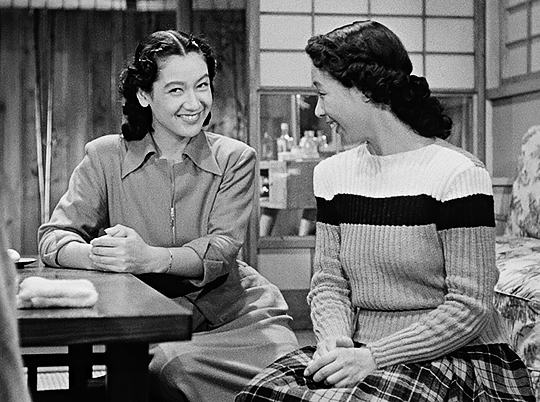
After work, Noriko meets Kōichi and Fumiko for dinner. While they eat, Kōichi complains about post-war women (“[They’ve] become so forward.”) and Noriko corrects him: “We've just taken our natural place.” Kōichi then claims that’s why Noriko can’t get married, and she rebukes him: “It’s not that I can’t. I could in a minute if I wanted to.” (Note: a bit of foreshadowing here.)
Next occur the two key events that set the main plot in motion. First, Noriko’s great-uncle (Seiji Miyaguchi) arrives for a visit. He wonders why she isn't married yet. “Some women don't want to get married,” he tells her. “Are you one of them?” Noriko laughs and leaves the room, but the seed has been planted in the minds of her family.
Noriko’s boss also thinks it's time for her to get married, and he has just the man for her: “He’s never been married. Not sure if he's still a virgin.” Her boss has photographs to show her, and won’t leave her leave without taking them.
Meanwhile Noriko and Aya mercilessly tease one of their married friends, and after attending another friend’s wedding have dinner with that friend and another married friend, with a side dish of sexual innuendo. One of the married friends brags about how she spent a rained-out honeymoon playing with a “spinning top”: “My husband is very good at it.” Her friend cautions her: “You shouldn't flaunt it in front of the single girls.”
However, Aya is not impressed with the implied amazingness of heterosexual intercourse: “Silly! We don’t play with tops, do we?” Noriko enthusiastically agrees with her: “That’s for children, isn’t it?” The debate between the married and the unmarried continues, after which Noriko goes home, where Kōichi and Fumiko are scheming regarding the marital candidate proposed by Noriko’s boss.
Kenkichi’s mother then visits Noriko’s mother, and tells her that a man from a detective agency has been asking about Noriko: “I realized it was about her marriage.” We also learn that Kenkichi’s wife died two years ago (leaving him with a young daughter), and that he's not interested in remarrying: “All he does since his wife died is read books” (like Les Thibaults). Finally, we learn that Kenkichi’s best friend, Noriko’s brother Shoji, went missing in the war.
We now come to the climax of the first half of the movie. As Noriko’s nephews and their friends play with their model train set downstairs (one nephew asking if their father will buy them more train track), Aya visits Noriko and they talk in her room upstairs. Their married friends have made various excuses for why they couldn’t also visit; Noriko recalls how close they were at school and laments their drifting apart.
Throughout the first half of Early Summer Noriko and Aya are shown as mirroring each other’s gestures and speech. That mirroring continues in this scene (for example, they sit down next to each other at the exact same time and in the exact same manner), and then a very interesting thing happens. Ozu’s typical modus operandi is to continue a shot until someone stops speaking or moving, or even until they leave the room. But here he cuts immediately from Noriko and Aya simultaneously raising their glasses to drink, to Noriko’s father and mother simultaneously bringing food to their lips, as they relax sitting on a street curb in town.
If I were to speculate about what this juxtaposition might mean, if anything, I’d speculate as follows: that Ozu intended to show that, whatever Aya and Noriko might be to each other, they are as close, secure, and happy in their relationship as Noriko’s mother and father are in theirs — as much a couple as any other in the film, but not formally recognized as such.
Noriko’s father tells his wife, “This may be the happiest time for our family,” although he’s sad at the thought of Noriko leaving. They continue their conversation, and then are interrupted by the site of a balloon rising into the sky. “Some child must be crying,” Noriko’s father remarks. “Remember how Kōichi cried when he lost his balloon?”
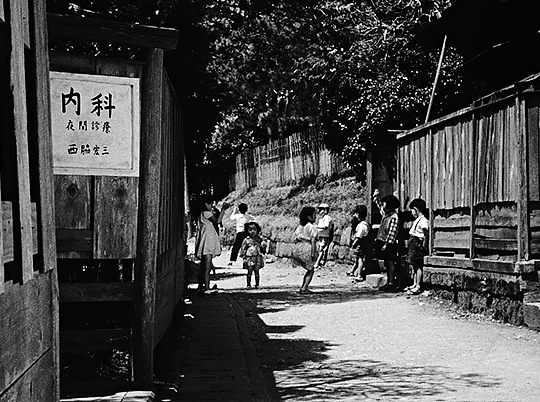
…
The good times continue as Noriko brings home a cake to eat with her sister-in-law Fumiko, and their neighbor Kenkichi drops in unexpectedly and is invited to share it with them. The scene re-introduces Kenkichi and brings up the subject of his remarrying — something he doesn’t want, but his mother (played by Haruko Sugimura) does.
…
In the meantime Noriko’s brother Kōichi has been pursuing the idea of a marriage between Noriko and an unseen bachelor first suggested by Noriko’s boss, including asking his friends and associates for more information on the proposed groom. The results are “very promising”: “He’s in the social register, and seems to be a fine businessman.” “How nice,” replies his mother, but, “how old is he?”
…
Then Noriko’s boss asks a few questions that we’ve been asking ourselves. While Noriko is away from work, Aya stops by, and the boss questions Aya on whether Noriko will go through with the match or not: “I don't understand her ... Is she interested in men?” Aya at first demurs: “What do you think?” Noriko’s boss has seen indications both ways, and presses the question: “Has she always been like that?” Aya responds in the affirmative. The questioning goes on. Aya tells him that Noriko’s apparently never been in love, “but she has an album of ... Hepburn photos this thick,” holding her thumb and forefinger about 4 centimeters apart.
Here we have the first of two translation issues. Aya actually refers to “Hepburn” without mentioning a given name. The Criterion subtitles — by Donald Richie, who should have known better — make this a reference to Audrey Hepburn, who’d had only small roles by then. It’s almost certain that this is instead a reference to Katherine Hepburn, who was a major star by the time Noriko would have entered middle school. Was the teenaged Noriko besotted by the androgynous beauty of Katharine Hepburn (who would have made a stunning otokoyaku)? It sure looks like it.
The subtext now threatens to become text, as Noriko’s boss learns that “Hepburn” refers to an American actress, and asks the obvious follow-up question about Noriko. In the Criterion subtitles it’s translated as “So she goes for women?” The BFI translation puts it more bluntly: “Is she queer?” What is Noriko’s boss really asking? Japanese speakers can correct me here, but I believe his actual question uses the term “hentai.”
Western fans are used to thinking of “hentai” as referring to pornography. However, my understanding is that at the time of the film “hentai” in colloquial Japanese would have referred specifically to sexual behavior that was considered abnormal. So if Noriko’s boss did use the term, another possible translation might have been “Is she a pervert?” Both the Criterion and BFI translations soften the question; in particular BFI’s “is she queer?”, while defensible, risks projecting our current ideas about “queer” (including its positive connotations) onto a film created in a different time.
In any case, Aya is determined to shut down any discussion of Noriko’s proclivities. “No!” she firmly replies. Noriko’s boss is apparently unconvinced: “You can never know. She’s very strange, in any case.” His prurient instincts aroused, Noriko’s boss then envisions another solution to the problem of Noriko, and queries Aya about it: “Why don’t you teach her?” “About what?” “Everything.” “What do you mean, everything?” He pats her shoulder and admonishes her: “Don’t try to be coy,” as we viewers pause to consider the implications of what he’s asking her to do.
Aya rejects this line of inquiry as well: “Don’t talk to me like that! That was rude!” Noriko's boss laughs, offers a half-hearted apology, and then (after telling Aya that Noriko won’t be back that day) invites her to lunch and quizzes her on her preferences in sushi: “Tuna” she says. He continues, “How about an open clam?” (which Donald Richie's commentary helpfully informs us is a euphemism for the vagina). “Sure,” she replies. “And a nice long rice roll?” “No, thank you!” His final words are, “You’re strange too,” and again I think I hear the word “hentai” enter the conversation.
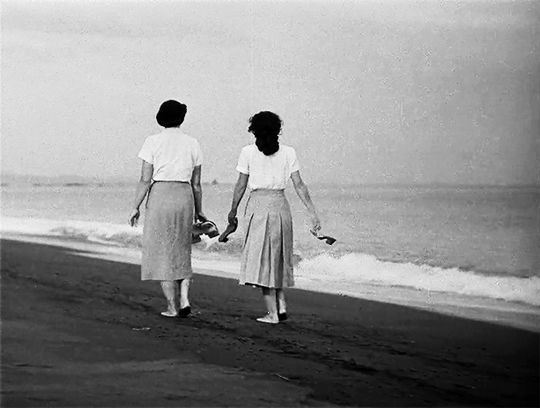
…
Recall that Kenkichi decided to accept an offer as a department head in a hospital in Akita, several hundred kilometers north of Tokyo and on the opposite coast. Noriko meets him in a café before her brother Kōichi is to host him at a farewell dinner party, and they talk about Shoji, Noriko’s other brother who went missing in action during the war. Kenkichi recalls how he and Shoji were best friends in school, often eating at this very café, indeed at this very table. Kenkichi tells Noriko that he still keeps a letter that Shoji sent him, with a stalk of wheat enclosed (probably indicating that Shoji was deployed in northern China). Noriko asks if she can have the letter, and Kenkichi agrees.
Afterward Noriko visits Kenkichi’s mother, while Kenkichi himself is still at his farewell party. Kenkichi's mother tells Noriko her secret dream (“please don’t tell Kenkichi”): “I just wish Kenkichi had gotten remarried to someone like you.” She apologizes and asks Noriko not to be angry (“It’s just a wish in my heart”), but Noriko stares at her with an intense expression (her usual smile absent), and asks her, “Do you mean it? ... Do you really feel that way about me?” Kenkichi’s mother apologizes again, but Noriko presses on: “You wouldn’t mind an old maid like me?” Then before Kenkichi’s mother can respond, Noriko speaks: “Then I accept.”
Kenkichi’s mother is incredulous. She asks Noriko several times to confirm what she’s saying, thanks Noriko effusively and weeps tears of joy at her good fortune, but continues to question Noriko about her decision even as Noriko leaves to go home. (Incidentally, this scene features a bravura performance by Haruko Sugimura.)
After she leaves the house, Noriko encounters Kenkichi, just returned from his farewell party. Noriko exchanges some small talk with him, but says absolutely nothing about what she just told his mother.
Noriko's decision then plays out across multiple scenes:
At first Kenkichi doesn’t understand what his mother is trying to tell him (“She accepted.” “Accepted what?”). When he finally gets the message (“She agreed to marry you. To become your wife!” “My wife?” “Yes. Isn’t it wonderful?”), he looks absolutely gobsmacked. His mother breaks down in tears again telling him how happy she is, and how happy he should be. He tries to play along (glumly echoing, “Yes, I’m happy”), but he looks for all the world like a man who would sooner eat nails than enter into another marriage.
Kenkichi’s mother doesn't understand why he’s not happy. She concludes, “What an odd boy you are.” The Japanese word here appears to be “hen,” which I understand to be a softer adjective than “hentai,” and not sexual in nature. But note that Kenkichi is now the third person after Noriko and Aya to be referred to as not normal in some way.
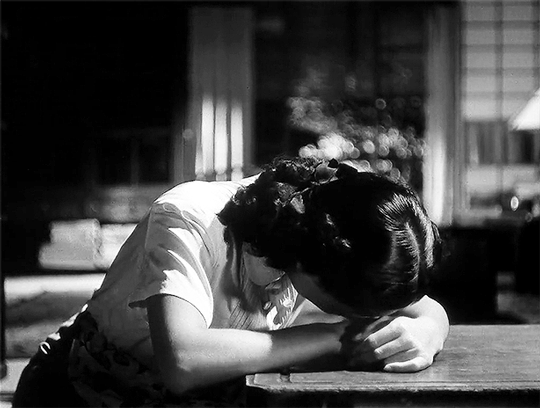
Meanwhile Noriko is interrogated about her decision by her family, especially by Kōichi, in a beautifully framed and shot scene — Noriko in white, her head bowed, her brother in black, barking questions like a prosecutor cross-examining a criminal. Noriko is unrepentant: “When his mother talked to me, I didn’t feel a moment’s hesitation. I suddenly felt I’d be happy with him.” Her parents retire upstairs to chew on their disappointment — Noriko walking silently past them on her way to her room — while Kōichi tells Fumiko, “What could we do now? She’s made up her mind. You know how she is.”
…
Meanwhile Noriko and Aya have their last scene together. It starts by echoing and completing the action at the end of their previous scene: then they raised their glasses together to drink, now they lower their glasses in a simultaneous gesture. Aya tells Noriko that she can’t believe Noriko would ever end up like this: she thought Noriko would be a modern woman living “Western-style, with a flower garden, listening to Chopin,” “wearing a white sweater, with a terrier in tow,” and greeting Aya in English — “Hello, how are you?”
Instead Aya now imagines Noriko wearing farmers clothes in rural Japan, speaking the local dialect. She playfully imitates country speech, and Noriko responds in kind: “Ya don’t look it, but ya talk like the locals.” “I figure to live in Akita when me and my man get hitched.” The subtext here I read as follows: Noriko knows how to pretend to be something she is not — a conventional heterosexual woman in a conventional heterosexual marriage — and she will accept doing so in her self-imposed exile from Tokyo, the price she must pay for avoiding what she considered to be a worse fate.
The tone then turns serious. Aya recalls meeting Kenkichi when they were in school, on a hiking trip with Noriko and her brother Shoji, and presses Noriko about her choice: “Did you already love him then?” “No, I had no particular feeling for him. ... I never imagined myself marrying him.” Noriko evades Aya’s questions about how she came to love Kenkichi, refusing time after time to acknowledge her feelings for him as those of love. Instead she insists, “No, I just feel I could trust him with all my heart and be happy.”
But trust Kenkichi for what? we want to ask Noriko. To respect her for who and what she is? To not want a conventional relationship with her? To not press her for sex or for children (after all, he already has one)? To keep her secrets, as she might keep any secret of his?
…
The family then gathers for one last commemorative photo. Without Noriko's salary they can no longer afford the house in Kamakura, so they break up: the parents to live with the great-uncle; Noriko to Akita with Kenkichi, his mother, and his daughter; and Kōichi, Fumiko, and their sons to some other less-expensive dwelling (perhaps an apartment in the Tokyo suburbs).
The parents recall when they moved into the house: “It was spring and Noriko had just turned 12.” Kōichi remembers that time as well: "She used to wear a ribbon in her hair, and she was always singing." But “children grow up so quickly,” her parents remark, and living together forever, "that's impossible."
Her usual smile nowhere in evidence, Noriko takes it all upon herself: “I’m sorry, I’ve broken up the family.” Despite reassurances from her father (“It’s not your fault. It was inevitable.”) she flees from the room, goes upstairs to her own room, and cries her heart out, distraught about the turn that her and their lives have taken.
The final scene shows Noriko’s parents at the great-uncle’s house, far from the sea. They glance at a wedding procession walking through the fields (“Look there. A bride is passing by. I wonder what sort of family she’s marrying into?”), think of Noriko, and resign themselves to the family's fate: “We shouldn’t ask for too much.” “We've been really happy.”
— Frank Hecker, “Ozu’s Early Summer Seems Pretty Darn Queer to Me”
#yasujiro ozu#ozu#queer history#setsuko hara#early summer#film criticism#queer film#gay subtext#queer coding#long post
35 notes
·
View notes
Text
youtube
Why "This is The Thanks I Get?" Failed As a Villain Song| Astor Rhymeaster
A great breakdown of why 'This Is the Thanks I Get?' fails as a Disney villain song.
21 notes
·
View notes
Text
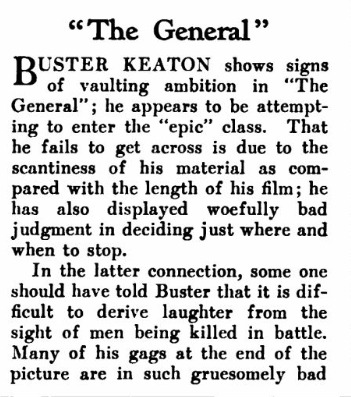

LIFE, February 24, 1927. Reviewer Robert E. Sherwood panned Harold Lloyd's THE KID BROTHER in the same article.
#film critic#film criticism#robert e sherwood#silent comedy#buster keaton#the general#1920s#1927#life magazine
13 notes
·
View notes